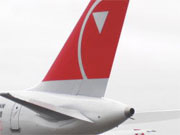Audio
Photos
More from MPR
| |||||||||||||||||||||||||||
September 16, 2005
Northwest Airlines says it will scale back some flights, and become a slightly smaller carrier as it reorganizes in bankruptcy. Northwest is the country's fourth largest airline and accounts for most of the traffic at Minneapolis-St. Paul International Airport. Scaling back routes will affect the company's share of the market here at its hub. It's unclear, however, whether that will create an opening for low-cost carriers to wedge their way into the local market.
St. Paul, Minn. — If you've been paying attention to any of the news about Northwest Airlines lately, you may have picked up on the point that airline bankruptcies are fairly common. But the reality is, airlines declare bankruptcy because they're enfeebled.
Northwest is losing $4 million a day. The effects of Sept. 11, 2001, exploding fuel costs, unwieldy debts to its pension fund, and competition with low-cost carriers drove Northwest to bankruptcy. While fuel and labor costs weigh it down most heavily, the company also says it needs to give up on unprofitable routes.
So one would think under those circumstances, other, more financially robust carriers might try to move in on Northwest's turf.
"Who else is going to come in and try to challenge them? The answer is nobody," says Barbara Beyer, president of the aviation consultancy Avmark.
Beyer says other carriers probably won't threaten Northwest's position in the Twin Cities market while the company reorganizes in bankruptcy court. Reorganization typically takes 12-18 months. Beyer says it's unlikely other carriers are nimble enough to move in during that time.
"Because the industry is beleaguered. And quite honestly, like it or not, Northwest dominates certain markets," says Beyer. "Unless they totally fail, which I doubt, nobody else can come in and challenge them."
The Metropolitan Airports Commission, or MAC, which owns and operates the Twin Cities Airport, also doubts Northwest's bankruptcy filing will bring new carriers into the area.
According to spokesman Pat Hogan, the commission does indeed want other carriers to enter the market. But that's not a new position. He says the MAC has been trying to lure low-cost airlines like Southwest and Jet Blue for years.
"In fact, we've never turned an airline away, and we would love to see them come in. In the bottom line, it's going to be a business decision on the parts of those airlines," says Hogan. "They want to put their planes where they think they can make the most money on them. I don't expect the Northwest bankruptcy declaration to have a material impact on their decision."
That view is echoed by Southwest Airlines spokeswoman Marilee McInnis. She says the airline has a list of dozens of cities asking Southwest to fly there, and it's unclear if Northwest's bankruptcy could lure it to the Twin Cities.
"This is a very recent development, and it's really too early to see how the market is going to come to bear on this. We have no plans to open another city this year, so I just don't know," says McInnis.
When Northwest was asked if its bankruptcy could open possibilities for other carriers to move into the Twin Cities, spokesman Kurt Ebenhoch said, "We consider all of the markets we serve to be competitive."
Ebenhoch points out that Minneapolis-St. Paul is already served by five low-cost carriers. He also says low-cost carriers compete with Northwest in 45 of the top 50 markets out of the Twin Cities.
But travel expert Terry Trippler says the competition at Minneapolis-St. Paul isn't really that keen, because of travellers' fidelity to Northwest. He says that keeps them from demanding the presence of low-cost carriers.
"One would think that consumers would want to see someone in. But when push comes to shove, the consumers want their World Perks miles, and they will support Northwest," says Trippler.
Northwest is famous for aggressively trying to keep competitors at bay. Carriers like Reno Air gave up trying to penetrate the Twin Cities market.
Airline analyst Joel Denney of the Minneapolis investment firm Piper Jaffrey says Northwest may gain even more of a stronghold while in bankruptcy.
"They have the ability to be very competitive, because they're not paying a lot of their debts. They're able to renegotiate their costs lower. They will be a much tougher competitor 18 months from now than they are today," says Denney.
Even with all its advantages, Northwest still has hard days ahead. Its mechanics union is still on strike, the company will need major concessions from all its other unions. And, of course, the high cost of fuel, one of the factors precipitating its bankruptcy, isn't going away.





